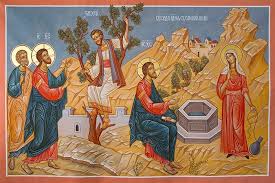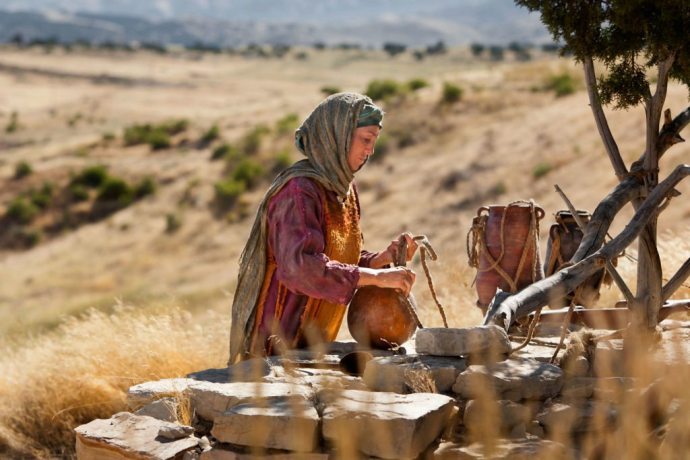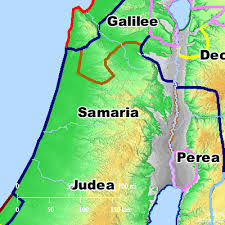παρα – εις
John’s constant use of the prepositions para/towards and eis/into with their emphasis on step-by-step movement is now reflected in the story of the Samaritan woman. She grows gradually into an understanding of who Jesus is and faith in him, resulting in many of her fellow-Samaritans coming to believe in Jesus.

Just a Jewish man (4.4-15)
Having walked from Galilee to Samaria in the glaring sun, Jesus was surely exhausted, dusty and in great need of a drink. As he sat himself down by the well, he can’t have looked much like the King of kings and Lord of lords! In his need he asks the Samaritan woman for some water. At this stage she has no idea that he is someone special. So she is surprised that he as a man should ask a woman for water. She is particularly surprised that he as a Jew would approach her, for Jews at that time did not “associate with Samaritans” (4.9) – the word translated “associate” may also indicate that Jews would not share a utensil with a Samaritan lest they be made ritually unclean by it. But Jesus breaks down such barriers. He is happy to approach a Samaritan woman and share a drink from the same container. So Jesus gives us a model of wide and open relationships.
The woman’s amazed response to Jesus’ request leads on to Jesus’ declaration that she should have asked him for a drink and he would have given her “living water”. But she had no idea who Jesus was or what gift from God he could have given her (4.10). Even when he explains that his gift of living water satisfies all possible thirsts and even imparts eternal life (4.13), she still can only think in terms of relief from having to come to the well each day to draw water. As with many people throughout history, material needs and the daily grind so occupy her that she cannot contemplate higher dreams.
At this stage the Samaritan woman has no conception of who this exhausted, thirsty man really is.

A Prophet (4.16-19)
Not put off by the woman’s materialistic outlook, Jesus changes tack and tells her to go back to the town and fetch her husband (4.16). When she responds by saying that she has no husband, Jesus exercises an amazing spiritual gift of discernment. He knows that she had previously had five husbands and is now living with a sixth man (4.17). What did Jesus mean when he declared that the sixth man was not her husband? Was she not married to this sixth man, just living with him? Or was he rejecting their relationship because of her immorality in marrying one man after another? He evidently was not opposing marriage after divorce, for he does clearly accept that her previous men were her husbands.
Jesus’ detailed discernment astonishes the Samaritan woman. He was evidently more than just a tired and thirsty Jewish man. So she declares, “I can see that you are a prophet” (4.19) – a good start, but committed faith needs more than that.

The Messiah/Christ (4.20-26)
Was the Samaritan woman embarrassed and trying to side-track Jesus after his penetrating words about her sinfully inadequate relationships? Or, having testified that he was a prophet, was she struggling with what it would mean for her as a Samaritan to accept a Jew as prophet? So she presents Jesus with the problem of where should people worship – in Jerusalem with the traditional house of God? Or In Samaria where her forefathers worshipped? Jesus unhesitatingly declares that “salvation is from the Jews” (4.22) and that Jews “worship what we know” whereas Samaritans ignorantly worship what they don’t know. Jesus’ approach hardly fits the politically correct liberalism of today!
Jesus goes on to declare that the time is coming and has indeed already come when true worship will not be tied to any localised place. God’s universal purposes mean that we can worship the Lord anywhere. No longer should we be restricted to any particular city or building. What is important is that we should worship God “in spirit and truth”. Worship in spirit without due emphasis on truth is empty froth. Worship with solid biblical truth, but without spirit, is dead.
Still today in our contemporary churches this teaching of Jesus remains deeply challenging. In some churches we enjoy dynamic lively worship in the Spirit which relates relevantly to modern youth culture, but often the biblical teaching lacks careful exposition and theological truth. And the worship itself may contain little or no biblical reference. On the other hand, other churches may include excellent biblical exposition with helpful teaching and content, but they may lack the life and vitality of the Spirit. In Jesus’ words spirit and truth go hand in hand. Both together should characterise our worship of the Father (not just Jesus!).
Hearing Jesus’ teaching, the Samaritan woman feels that she is out of her depth. Sensing her inadequacy, she declares her faith that the Messiah/Christ is coming and he will explain everything. Is she already coming to believe that Jesus is the Messiah? Certainly Jesus responds with the uniquely direct confession that he is ‘I am’, God himself incarnate (4.26). To no-one else does Jesus reveal his identity so clearly.

Wider witness (4.39-42)
Meeting with Jesus is so excitingly life-changing that you cannot keep quiet about it! Good news is infectious! Even with the Samaritan woman’s new and still somewhat unsure faith she immediately returns to the town and tells people about Jesus. As a result they welcome Jesus and persuade him to stay in the town for a couple of days before moving on to Jerusalem. Through his teaching many Samaritans believe in him and they testify that he truly (we may note John’s emphasis again on truth) is “the Saviour of the World”. He is the Saviour who liberates his people from all that is ungodly and against God’s perfect will. And he is the “Saviour of the world“. We are reminded of the four-fold repetition of “world” in John 1.9/10. Jesus has come not only for his own Jewish people, but also has a wider purpose to Samaritans and Gentiles.
Had so many Samaritans already come to believe in Jesus at this pre-Resurrection stage that Luke needs only to give brief mention of the Samaritans in his account of the expansion of the church in the Book of Acts? In Acts 8 Philip, and then Peter and John, have a powerful witness among the Samaritans, but only Acts 8.1-25 is given over to recounting God’s mission among the Samaritans. Nevertheless, in God’s plan for his world, they form the bridge between mission among Jews in Judea and Jerusalem (Acts 1-7) and the conversion of Paul, the apostle to the Gentiles (Acts 9), and then wider mission into the Gentile world.
Just a Jewish man -> a prophet -> the Messiah/Christ -> Saviour of the world.
We too are called to grow in our understanding of who Jesus is, our faith in him and our testimony to others.
We too are called to grow in our understanding of who Jesus is, our faith in him and our testimony to others.









Recent Comments